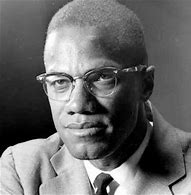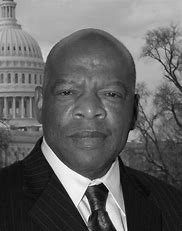Malcolm, Martin & John – A Mighty Legacy
A Legacy of Leadership and Personal Commitment
By Marcus McGee August 16, 2021
They could be called The Black Activist Triumvirate, because they reflect the divergence of philosophy, activism, methodology and legacy in the former two, as well as a sense of pragmatism going forward in the latter. In my own experience, Malcom was to be feared, Martin was to be admired, while once angry John eventually became the calming voice of reason and progress through transition in his full life.
Of course, I’m referring to the lives of Malcom X (neé Malcom Little, born in 1925, Omaha, Nebraska), Martin Luther King, Jr. (neé Michael King, Jr., in 1929, Atlanta, Georgia) and John Lewis (born in 1940, Troy, Alabama). In 2021, a fast-forward media/content consumed global society, it is not a safe assumption that many under 30 either know all three names or understand the history of this activist trifecta and the legacy they sacrificed their very lives to establish.
Being Black and born in the 1920s meant that Malcom and Martin’s grandparents were the sons and daughters of Black American slaves. The shadow of slavery was powerfully extant in the history, family stories, warnings and philosophy they shared with grandchildren. Imagine any of us speaking with our grandparents, who in describing their own parents, were talking about human chattel, government-sanctioned inferiority and heinous acts of forced servitude, brutality, rape and murder, based solely on the color of their skin.
Malcom and Martin became teenagers in the 1940s at the height of the Jim Crow era. According to a post by one Black Nebraskan, “Jim Crow was the name of the racial caste system which operated primarily, but not exclusively in southern and border states between 1877 and the mid-1960s.” It relegated Blacks to the status of second-class citizens and represented the legitimization of anti-Black racism.
Jim Crow laws were enforced by the threat of violence and often by horrific violence itself. They were a legally prescribed, rigidly enforced, multi state-wide system to disenfranchise the citizenship that had recently been conferred on Black patriots in the form of property destruction, beatings and lynchings, which were often sadistic murders, carried out by white mobs. With slavery over, former Confederates and conservatives (neé traditionalists) wanted to force Blacks into an alternative indentured servitude, take away their right to vote and protest, and control where they lived and where they could go (in safety). They also wanted to condition Black children with a sense of “Black inferiority” as they conditioned their own children with a sense of “white supremacy.”
As a part of daily life, Blacks were relegated to the backs of busses, could not drink at “white-only” fountains, and were excluded from swimming pools, movies, department stores, hotels and restaurants—all this as the lynching throughout the South and border states endured on a weekly basis. For Malcom and Martin, Jim Crow was a way of life, and both reacted to and were influenced by their youthful experiences with degradation and injustice.
Malcolm
Malcom Little spent his adolescence moving from foster home to foster home after his father, Earl, was murdered in Detroit and his mother, Louise, was committed to a mental hospital in Kalamazoo. Untethered and neglected, he turned to a life of crime and in 1946, and it 1952 he was sentenced to 10 years in prison for larceny and breaking and entering. His epiphany in incarceration came when he joined the Nation of Islam and became Malcom X.
As Malcom X, he advocated for Black empowerment and the separation of Black and white Americans, stressing Black power and Black independence, while criticizing the racial integration mainstream civil rights movement, led by the National Association for the Advancement of Colored People (NAACP), the Congress of Racial Equality (CORE), the Southern Christian Leadership Conference (SCLC), the Student Nonviolent Coordinating Committee (SNCC) and the leadership of Dr. Martin Luther King, Jr.
Martin
Martin Luther King, Jr. was the son and namesake of a Baptist minister in Atlanta. The son of civil rights activist Martin Luther (Michael) King, Sr., he was inspired by his Christian beliefs as well as the nonviolent activism of Mahatma Ghandi.
Martin attended and graduated from Morehouse College in Atlanta with a Bachelor of Arts degree in sociology in 1948 at 19 years of age before enrolling a Crozer Theological Seminary for a Bachelor of Divinity degree in 1951. He began doctoral studies at Boston University and later audited philosophy classes at Harvard. He received is Ph.D. in 1955. During that year, King, E.D. Nixon and Clifford Durr took up a case for Rosa Parks, a Black woman in Montgomery, Alabama, who was arrested for refusing to give up her seat for a white man, which began the Montgomery bus boycott and launched the activist career of Dr. King.
As and activist and civil rights leader, King led marches for Blacks’ right to vote, for desegregation, labor rights and for civil rights. Aligned with the SCLC, he advocated nonviolent resistance for those and other civil rights. In 1960, after being arrested for participating in a sit-in for desegregation, a judge invoked a previous plea deal (related to driving without a valid Georgia license) and sentenced Martin to four months of hard labor at a maximum-security state prison, which made him a felon.
Martin gained greater national recognition from the nonviolent though confrontational campaign in Birmingham, Alabama in 1963. While incarcerated there, he composed Letter from a Birmingham Jail, and later that year, on August 28, he delivered the iconic I Have a Dream speech while standing on the steps of the Lincoln Memorial before a crowd of 250,000 on the National Mall and assembled around the reflecting pool. The speech called for an end to racism, which has persisted some 58 years later.
Both Malcom and Martin were assassinated, both shot dead at age 39 by elements determined to silence them: Malcom by an initial shotgun blast to his chest and 21 subsequent gunshot wounds to his body; and Martin by a single rifle shot to his face.
John
John Robert Lewis was the third of ten children born on a sharecropping farm in Pike County, Alabama, into a thoroughly segregated community. At age six, he had seen only two white people in his lifetime. As a teenager, he followed the Montgomery bus boycott and began to admire Dr. King. After being denied admission at Troy University, he wrote to King about suing the college for discrimination and met King for the first time. Ultimately, he attended and graduated from American Baptist Theological Seminary in Nashville and was ordained as a Baptist minister.
Inspired by King, he became an activist in the civil rights movement. He was first arrested and jailed during a Nashville sit-in movement protesting the segregation of department store lunch counters, which was the first of many arrests. He explained that “good trouble” was necessary to achieve change. In 1961, he became one of the original 13 Freedom Riders.
When in 1961 as a Freedom Rider, John attempted to enter a whites-only waiting room, two white men attacked the peaceful protesters, beating him in the face and kicking at his ribs. Later in Birmingham, he and other Freedom Riders were beaten by a mob (which included KKK members) with baseball bats, chains, lead pipes and stones, only to be arrested by the police.
In 1963, he became the chairman of the Student Nonviolent Coordinating Committee (SNCC) and became one of the “Big Six” leaders who organized the March on Washington in August 1963. He was fourth to speak, mere minutes before Dr. King’s famous speech.
In 1977, John ran for the seat Andrew Young abandoned to become U.S. Ambassador to the United Nations under former President Jimmy Carter, but his bid was unsuccessful. However, in 1986 he ran again for Georgia’s 5th district again, an underdog against state representative and primary opponent Julian Bond, but this time he won, and he won the general election, where he was favored. He was reelected 16 times and died while in office.



